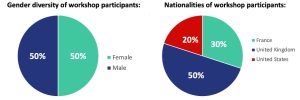On 28-29 November 2023, the ELN convened a workshop of ten experts with diverse backgrounds and expertise to identify the risks posed by the aggregate effects of emerging and disruptive technologies (EDTs) on nuclear command, control, and communications (NC3). The primary aim of the workshop was to initiate expert discussion on the development of a robust checklist and guardrails framework, specifically tailored to anticipate and tackle challenges associated with the integration of EDTs within the military domain and their impact on NC3 systems.
This workshop is part of one of three working strands in a broader project undertaken by the ELN and funded by the German Federal Foreign Office. The primary objective of this project is to develop a policy resource framework with which states can reference to minimise risk from the aggregate effect of EDTs and their associated pressures on the nuclear decision-making processes, which will help effectively manage potential escalation scenarios.
Preceding the workshop, the ELN identified several key EDTs that could potentially amplify decision-making variables during a nuclear crisis: 1) autonomous weapons and drones, 2) counterspace capabilities, 3) cyber offensive capabilities, 4) Artificial Intelligence, 5) deepfakes, and 6) quantum technologies.
While substantial efforts have already been invested in understanding the isolated implications of each technology on NC3, this project adopts a holistic approach to EDTs, examining the technological complexity presented by disruptive technologies operating in ‘aggregate.’ Workshop participants were encouraged to concentrate on the core question: “How will nuclear command, control, and communications be influenced by technological complexity—not by one technology or another in isolation, but by everything that might be in play in aggregate?”

During the first session of the workshop, participants considered the many aspects of EDTs on NC3. Discussion encompassed a wide array of considerations that included:
- the impact of EDTs on trust levels within the information ecosystem;
- the imperative of ensuring operators and decision-makers understand the underlying logic that leads to outputs produced by EDTs – and the risks and potential errors they can pose – when integrating these technologies into NC3 systems;
- challenges associated with delays or partial implementation of updates and security patches and with the adoption of cutting-edge technology that may not yet be fully matured, thereby potentially exposing NC3 to vulnerabilities;
- and the inherent risks associated with autonomy in weapon systems.
Key benefits identified during the session included:
- the utilisation of EDTs for verification purposes;
- the mitigation of nuclear risk through the augmentation of non-nuclear response options;
- and the capability of EDT-powered decision-support systems to provide decision-makers with timely and readily accessible information as required.
On day one, the main takeaway highlighted that the cumulative impact of EDTs on NC3 primarily affects situational awareness, particularly evident when these technologies are integrated into early warning systems, rather than significantly affecting decision-making timeframes.
The focus of the workshop’s second day was on formulating risk reduction strategies aimed at mitigating the potential negative impacts of EDTs on nuclear decision-making processes. Facilitated by ELN staff, participants identified key elements necessary for creating a checklist outlining the challenges posed by EDTs.
During the second part, participants considered the key the components of an EDTs guardrails framework, which aims to foster responsible state behaviour and reduce risks within the NC3 context.
The workshop concluded with a deliberation on the practical considerations involved in socialising the proposed framework with policy experts and officials.


